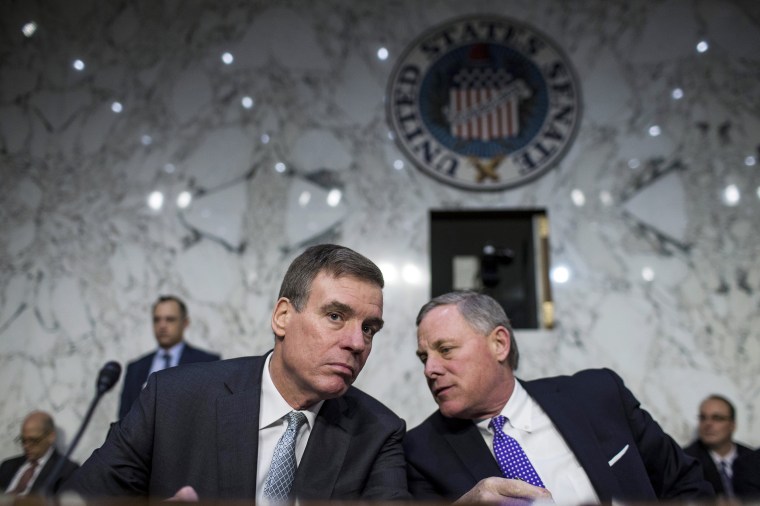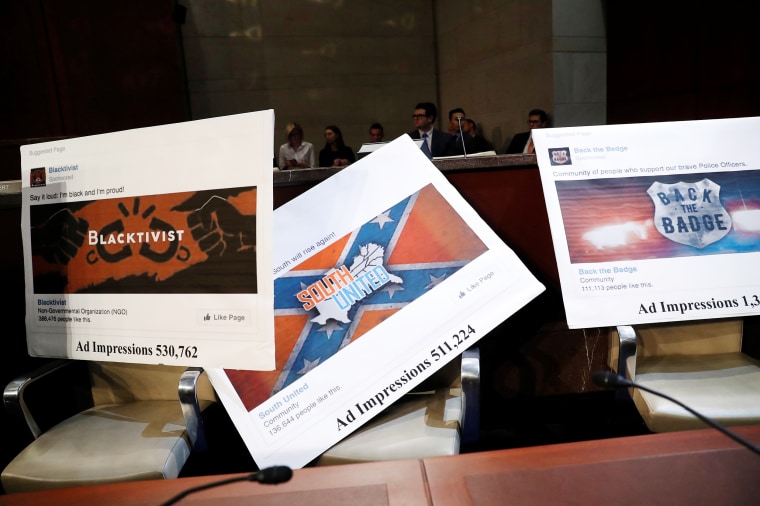A new pair of reports detailing the extent of Russia's social media propaganda efforts during the 2016 election and beyond reveal how much still needs to be done to counter misinformation, Democratic lawmakers said on Monday.
Sen. Mark Warner of Virginia, the ranking member of the Senate Intelligence Committee, said the reports, prepared for his panel and obtained by NBC News on Monday, should serve as a "wake-up call."
"These attacks against our country were much more comprehensive, calculating and widespread than previously revealed," he said in statement. "This should stand as a wake-up call to us all that none of us are immune from this threat, and it is time to get serious in addressing this challenge."
"I hope these reports will spur legislative action in the Congress and provide additional clarity to the American public about Russia’s assault on our democracy," Warner added.
The reports lay out how Russian agents used major platforms like Facebook and YouTube to spread disinformation, temper the minority vote and boost President Donald Trump's candidacy.
Senate Intelligence Committee Chairman Richard Burr, a North Carolina Republican, said the reports illustrated how "hostile foreign actors seeking to manipulate and subvert public opinion" can take advantage of social media platforms for nefarious purposes. He specifically pointed to how the efforts were aimed at dividing Americans by "race, religion and ideology" to "erode trust in our Democratic institutions."
"Most troublingly, it shows that these activities have not stopped," he continued.
Researchers, who dug through millions of posts from the most prominent social media platforms, showed that the Russian disinformation campaign on social media was much more extensive than first understood. Those researchers were looking at posts created by the Internet Research Agency (IRA), the Russian-based firm whose executives were indicted by special counsel Robert Mueller on charges of defrauding the United States.
The reports concluded that the agency's mission was to help Trump and hurt 2016 Democratic presidential nominee Hillary Clinton by both amplifying right-wing conspiracy theories and spreading messages aimed at suppressing liberal voting groups, particularly black Americans.

The reports were written by Oxford University’s Computational Propaganda Project and Graphika, a network analysis firm, and New Knowledge, a cybersecurity firm specializing in disinformation.
Researchers who worked on the second report counted more than 260 million engagements with IRA content on Facebook and Instagram alone, saying that the initial number of people Facebook said was exposed to the propaganda — 126 million — was likely a low-ball figure.
Noting that the U.S. government has done little to prevent such foreign disinformation campaigns from taking place on social media moving forward, the New Knowledge report said Russia sought to "reinforce tribalism, to polarize and divide, and to normalize points of view strategically advantageous to the Russian government on everything from social issues to political candidates,” through their efforts.
Rep. Adam Schiff, D-Calif., the likely incoming chairman of the House Intelligence Committee, said in a statement on Monday that the reports are "essential" to better understanding how Russia "strategically manipulated social media platforms."
"The Russian efforts are sophisticated, cynical, effective and, most significant, ongoing," he said. "The authors’ conclusion — that the Russians not only sought to divide Americans along racial, ethnic and political fault lines but also sought to advance the candidacy of Donald Trump and harm that of Hilary Clinton — accord with our own findings and that of our Intelligence Community."
Researchers found that Russian agents were most aggressive in targeting black Americans and supporters of Sen. Bernie Sanders, I-Vt., pushing them to refrain from casting ballots for Clinton. Russians set up 30 Facebook pages targeting black Americans while other left-wing pages aimed to push Sanders' supporters to either vote for Green Party candidate Jill Stein or abstain from the 2016 presidential election.
Sanders reacted to the reports on Monday, tweeting, "We must do everything we can to protect our democracy and work with allies to do the same."
Other lawmakers joined in on Twitter.
The Senate Intelligence Committee, in addition to Mueller, is probing Russian interference in the 2016 election. The committee plans to release its own report on Russia's social media manipulation.

